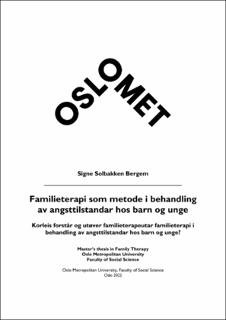| dc.contributor.advisor | Jevne, Kari Sjøhelle | |
| dc.contributor.author | Bergem, Signe Solbakken | |
| dc.date.accessioned | 2022-10-04T07:33:05Z | |
| dc.date.available | 2022-10-04T07:33:05Z | |
| dc.date.issued | 2022 | |
| dc.identifier.uri | https://hdl.handle.net/11250/3023476 | |
| dc.description.abstract | Tema for denne masteroppgåva er familieterapi som metode i behandling av angsttilstandar hos barn og unge. Barn si utvikling skjer i eit samspel mellom eigenskapar hos både barn og foreldre, og måten foreldra møter behov hos barnet på. Resultatet av eit uheldig samspel og visse typar foreldreåtferd, kan føre til utvikling av angsttilstandar. I behandling av angsttilstandar hos barn og unge er det ei rådande oppfatning at individuell kognitiv åtferdsterapi er den mest effektive behandlingsmetoden. Likevel er det ikkje alle som har godt utbytte av metoden. Med utgangspunkt i kunnskapen om foreldra si betydning for utvikling av angsttilstandar, rettar eg søkelyset mot behov for forsking på foreldreinvolverande metodar i behandling av angsttilstandar hos barn og unge. Med grunnlag i masteroppgåva mi, håper eg å kunne bidra med kunnskap om korleis familieterapi kan vere ein alternativ metode, som involverer foreldra og familien som heilskap, i behandling av angsttilstandar hos barn og unge. Problemstillinga for masteroppgåva er: Korleis forstår og utøver familieterapeutar familieterapi i behandling av angsttilstandar hos barn og unge?
Studien min bygger på kvalitative intervju med ni familieterapeutar om deira erfaringar med behandling av angsttilstandar hos barn og unge. Datamaterialet er tematisk analysert og viser følgande seks hovudkategoriar som relevante i familieterapeutisk behandling av angsttilstandar hos barn og unge: Forståing av angsttilstandar som systemisk og mellommenneskeleg fenomen. Det er viktig å skape tryggleik. Å ha eit relasjonelt perspektiv på angsttilstanden. Å utforske problemhistoria. Å ansvarleggjere familien og å mobilisere ressursar.
Studien viser på kva måtar familieterapi kan vere ei aktuell og alternativ behandling for barn og unge med angsttilstandar. Eit særleg viktig funn i studien er at terapien skal føre til at barnet og familien sit igjen med nye forståingar av kvarandre og angsttilstanden, og generelt har eit nytt og meir positivt bilete av seg sjølv. | en_US |
| dc.description.abstract | The theme of this master's thesis is family therapy as a method in the treatment of anxiety disorders in children and adolescents. Children's development takes place in an interaction between characteristics in both children and parents, and the way parents meet the child's needs. The result of an unfortunate interaction and certain types of parental behavior can lead to the development of anxiety. In the treatment of anxiety disorders in children and adolescents, there is a prevailing opinion that individual cognitive behavioral therapy is the most effective treatment method. However, not everyone benefits from this method. Based on the knowledge of parents' significance for the development of anxiety disorders, I focus on the need for research on parent-involving methods in the treatment of anxiety disorders in children and adolescents. Based on my master's thesis, I hope to be able to contribute with knowledge about how family therapy can be an alternative method, which involves parents and the family as a whole, in the treatment of anxiety in children and adolescents. The research question for the master's thesis is: How do family therapists understand and practice family therapy in the treatment of anxiety disorders in children and adolescents?
My study is based on qualitative interviews with nine family therapists about their experiences with the treatment of anxiety in children and adolescents. The data material is thematically analyzed and shows the following six main categories as relevant in family therapeutic treatment of anxiety disorders in children and adolescents: Understanding of anxiety disorders as a systemic and interpersonal phenomenon. It is important to create security. To have a relational perspective on the state of anxiety. To explore the history of the problem. To make the family responsible and to mobilize resources.
The study shows in what ways family therapy can be a relevant and alternative treatment for children and young people with anxiety. A particularly important finding in the study is that the therapy should lead to the child and the family being left with new understandings of each other and the anxiety disorder, and generally have a new and more positive image of themselves. | en_US |
| dc.language.iso | nno | en_US |
| dc.publisher | OsloMet-Storbyuniversitetet | en_US |
| dc.subject | Familieterapi | en_US |
| dc.subject | Angst | en_US |
| dc.subject | Barn | en_US |
| dc.subject | Ungdom | en_US |
| dc.title | Familieterapi som metode i behandling av angsttilstandar hos barn og unge | en_US |
| dc.type | Master thesis | en_US |
| dc.description.version | publishedVersion | en_US |
